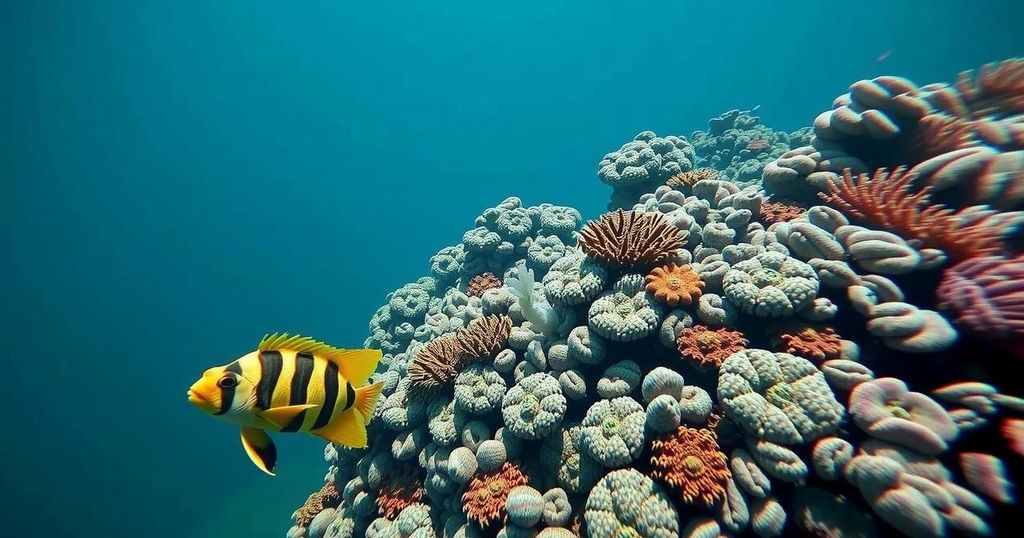The United Nations has called for increased funding to protect coral reefs, which are facing a crisis due to widespread bleaching caused by climate change. An emergency session at the biodiversity summit in Colombia prompted pledges of $30 million from several governments to support coral conservation efforts. Nearly 77% of global reefs are affected, and immediate actions are necessary to prevent their extinction. Future conferences aim to mobilize additional funds for these vital ecosystems.
The United Nations (U.N.), in conjunction with scientists and governmental entities, issued an urgent appeal on Wednesday for heightened financial contributions aimed at protecting coral reefs, which face the dire threat of extinction. Recent research has disclosed that an alarming 77% of the world’s coral reefs have been impacted by bleaching, largely attributable to the increasing temperatures of ocean waters linked to anthropogenic climate change. This event, marking the fourth significant global coral bleaching crisis to be recorded, is adversely affecting reef systems in both the Northern and Southern Hemispheres, as reported by the United Nations Capital Development Fund. In reaction to these distressing findings, a specialized emergency session, a rarely convened gathering typically focused on escalating conflicts or natural disasters, was summoned to address the corals crisis on the fringes of the U.N. biodiversity summit, COP16, which is currently in progress in Cali, Colombia. Coral reefs represent critical ecosystems, supporting more than 25% of marine biodiversity and sustaining nearly a billion humans who depend on these resources for food security, coastal protection, and economic livelihoods. As a result of the emergency session, several nations, including New Zealand, the United Kingdom, Germany, and France, collectively pledged approximately $30 million to the U.N. fund dedicated to coral reef conservation, established in 2020. This fund aims to mobilize up to $3 billion in public and private financing for coral conservation initiatives by the year 2030, with approximately $225 million already raised. U.K. Minister for Nature, Mary Creagh, emphasized the critical nature of oceanic protection, stating, “Protecting our ocean and its precious habitats is fundamental to life on earth. But without urgent action, the world’s coral reefs face extinction from global heating, acidification, disease, and pollution; a vital ecosystem lost within our lifetime.” Next year is set to host a U.N. ocean conference in Nice, France, during which nations will be encouraged to commit additional resources to the global fund aimed at coral reefs, with a target of raising an extra $150 million in donations ahead of the conference. Peter Thomson, the U.N. Secretary-General’s Special Envoy for the Ocean, articulated the urgency of the situation: “In 2024, climate change and other human impacts triggered the fourth mass coral reef bleaching event, the most extensive and devastating on record. With the window to protect these ecosystems closing rapidly, world leaders must act now.” Coral bleaching transpires when elevated water temperatures induce corals to expel the algae that provide them with essential nutrients, leading to a loss of color and heightened stress levels. Additional factors contributing to coral bleaching include extreme low tides, pollution, and excessive sunlight exposure. Within the world’s largest coral reef system, Australia’s Great Barrier Reef, it was reported in 2022 that 90% of evaluated corals experienced bleaching, while significant bleaching also affected the Florida Coral Reef, the third-largest in the world, in the previous year. According to Kenyan marine ecologist David Obura, who oversees Coastal Oceans Research and Development in Indian Ocean East Africa, the occurrences of mass bleaching began in 1998, followed by subsequent events between 2011-2013 and in 2016. Obura remarked, “They’re lasting more than one year at a time, which is worrying,” during the U.N. emergency session.
Coral reefs are essential marine ecosystems that play a crucial role in maintaining marine biodiversity and supporting human livelihoods. The global rise in ocean temperatures, primarily resulting from climate change driven by human activities, has led to widespread coral bleaching. This phenomenon occurs when corals expel the symbiotic algae that provide them nutrition, resulting in stress and potential mortality. The current state of the world’s coral reefs necessitates urgent international cooperation and funding to implement effective conservation strategies to prevent further decline and to foster marine restoration efforts, particularly as 77% of reefs globally are reported to be under threat as of this year. In light of these challenges, the U.N. and various governments are mobilizing resources and pledges aimed at coral conservation, emphasizing the need for immediate action.
In summary, the recent emergency session convened by the U.N. highlights the urgent threat facing coral reefs due to widespread bleaching exacerbated by climate change. With significant pledges made by several nations to bolster funding for coral conservation efforts, the call for immediate action is evident. Acknowledging the vital role coral reefs play in marine ecosystems and human sustenance is crucial for ensuring their protection and sustainability. As global leaders gather ahead of the upcoming U.N. ocean conference, it is imperative that they commit to substantial financial and collaborative efforts to secure the future of these vital ecosystems before it is too late.
Original Source: www.voanews.com






